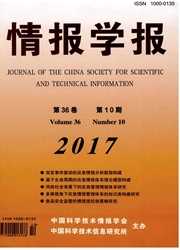

 中文摘要:
中文摘要:
为了满足新手用户对检索知识的在线e-学习需求与偏好,提高学术资源利用效率,有必要充分重视数据库界面设计的改善,由此开展相关的用户研究具有意义。为此本文选择数据库界面最常用的三个检索元素:初级检索、高级检索、专业检索作为实验情景,试图通过设计两种不同干预程度的界面帮助信息,让大学生新手用户在CNKI实际检索平台上执行n轮检索实验任务,由此观测用户怎么学习自认为最合适的检索方法,重点尝试探索利用MCMC转移矩阵方法观测用户这种心智活动的变化。最后得到主要的结论有:①强干预比弱干预有更大的诱导力刺激用户有意识的全面尝试学习三种方法;②强干预比弱干预有更大的诱导力刺激用户有意识的学习专业检索方法;③强干预比弱干预能更好的提升用户学习绩效;④不管多大的干预,大多用户会保持一定的理性决策,在尝试各种方法后最后会依据实验任务性质聚敛到高级检索上。
 英文摘要:
英文摘要:
Abstract In order to meet the novice users' needs and preferences of learning the knowledge of retrieving online, to improve efficiency of using academic resource, we need to give full attention to the improvement of designing interface of the database, so the user research is valuable. Therefor we choose the three most commonly be used elements of database interface: the primary search, advanced search, professional search as the experimental scene, trying to design two different levels of intervention of helping information in the interface, make undergraduate stand for novice users to perform retrieval tasks of n times in actual search platform of CNKI, thus observing bow user consider the most appropriate search method, focusing on attempting to explore useing the method of MCMC transfer matrix to observe the change of users' mental model. Finally, the main conclusions are: ① Strong intervention has greater inductivity than the weak intervention to stimulate user consciously try to learn all the three search methods. ② Strong intervention has greater induetivity than the weak intervention to stimulate user consciously try to learn professional search method; ③ Strong intervention better than the weak intervention to enhance the learning performance; ④ No matter how much the intervention is giving, most usersmaintain rational decision-making,after trying various search methods,based on the nature of experimental tasks, return to advanced search method eventually.
 同期刊论文项目
同期刊论文项目
 同项目期刊论文
同项目期刊论文
 期刊信息
期刊信息
